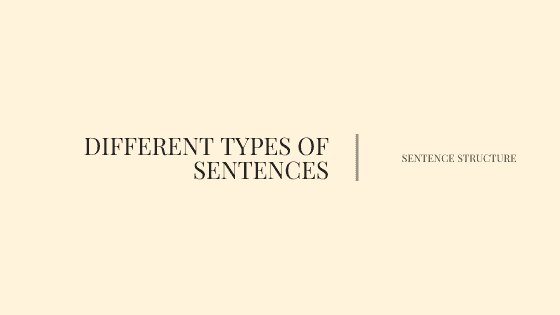TYPES OF SENTENCES
Different Types of Sentences: Sentences are just a set of words. The two main parts of a sentence are the SUBJECT and the PREDICATE.
SUBJECT: What the sentence is about.
PREDICATE: What is said about the subject.
Sentence expresses a complete thought. Sentences can’t be defined easily.
Basically, there are four main types of sentences as mentioned below,
- Declarative sentence
- Imperative sentence
- Interrogative sentence
- Exclamatory sentence
DIFFERENT TYPES OF SENTENCES:
Sentences are also classified based on the Degree of Comparison and Clause structure.
DEGREES OF COMPARISON:
- Positive sentence
- Comparative sentence
- Superlative sentence
DIFFERENT TYPES OF SENTENCES BASED ON CLAUSE STRUCTURE:
- Simple sentence
- Compound sentence
- Complex sentence
DECLARATIVE SENTENCE
These types of sentences are semantically determinant sentences. In simple words, a sentence that makes a statement or gives information is called a declarative sentence.
A declarative sentence can also be a simple, compound or a complex sentence based on the clauses the sentence is constructed with.
To put it into a nut shell, the declarative sentence is merely a statement.
Example:
- George Washington was the first president of the United States. (Simple sentence)
- I really like pizza, but I do not like pizza that has onions on it. (Compound sentence)
- Roads are made from asphalt.(Simple)
IMPERATIVE SENTENCE
This type of a sentence is merely a command or an instruction. Imperative sentences have the base as a verb and its subject is always (YOU).
Imperative sentences don’t have a readily identifiable subject; the subject of this type of a sentence is always implied. (Elliptical)
Mostly the imperative sentences end with an exclamation sign or a period.
Example:
- Put that down now!
- Come over here, look at this specimen, and tell me what you think.
- Everybody look!
INTERROGATIVE SENTENCE
These types of sentences are questions, undoubtedly, they end with a question mark. Finding the subject would be a slightly difficult task here, as the subject will lie between the parts of the verb phrase.
Interrogative sentence is made by inverting the subject and the predict.
Example:
- Did Nina sleep well?
- Haven’t you brushed your teeth yet?
- Where have you been?
EXCLAMATORY SENTENCE
This type of sentence is a statementthat conveys more emotion and excitement. It’s a main clause that expresses a strong feeling.
Example:
- I am angry!
- You won the prize!
- That’s a huge whale!
DEGREES OF COMPARISON
When we try to compare one person or a thing with another that is where the degree of comparison comes into play.
Positive Degree:
Positive degree refers to the alternate version of the adjective used without any suffix added to the adjective.
Usually, sentences are written in positive degree when quality of only one object or person is spoken of. In rare occasions the object or the person can be compared by adding ‘as’ to the adjective.
Example: 1. He is a tall student.
2. John is as smart as Tom.
Comparative Degree:
Comparative degree is used when comparing two different objects or persons. When the suffix ‘er’ is added to a single syllable or two syllable adjectives, the sentence becomes a comparative degree.
For adjectives with two or more syllables words like more or less is used. In simple, adding ‘er’ to the positive degree will make it a comparative degree.
Example: 1. William is stronger than Thomas.
2. Mary is more beautiful than Katherine.
Superlative Degree:
Superlative degree compares more than two items and it is considered as the highest degree. When the suffix ‘est’ is added to a single syllable or two syllable adjectives, the sentence becomes a comparative degree.
For adjectives with two or more syllables words like most or least is used. In simple, adding ‘est’ to the positive degree will make it a superlative degree.
Example: 1.Jim is the tallest in the class.
2. Tom listens most attentively of all students.
